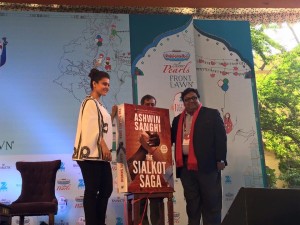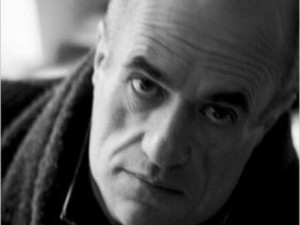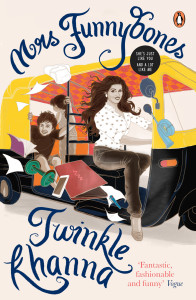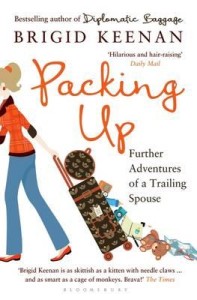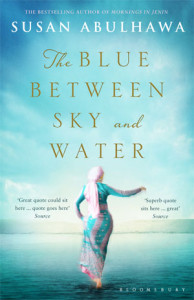
JaipurBookMark is a B2B conference organised at Narain Niwas, Jaipur. It runs parallel with the Zee Jaipur Literature Festival on the 21 – 22 January 2015. The programme and registration details are available at: http://bit.ly/1KxRcZx
Aditi Maheshwari holds Masters degrees in English literature (Hansraj College, Delhi University) and Business Management (Strathclyde Business School, Scotland) and a pre-doctoral/ M.Phil. degree in Social Sciences (Tata Institute of Social Sciences, Mumbai). She also holds a diploma in Public Relations and Advertising. She heads the Department of Copyrights and Translation at Vani Prakashan and is the Managing Trustee at Vani Foundation.
Ajit Baral, an alumnus of the International Writing Program-2011, Iowa University. Ajit Baral is the author of Lazy Conman and Other stories (Penguin, India), Interviews Across Time and Space (FinePrint). He is the co-editor of New Nepal, New Voices (Rupa, India) and the editor of First Love (in Nepali). He has contributed articles, book reviews and short prose pieces to national and international magazines, journals and book forms. He used to coordinate the literary supplement of Nagarik, Akshyar, the first stand-alone literary supplement in Nepal. He runs an independent bookstore, Bookworm and is the co-founder of a Kathmandu-based publishing house, FinePrint and the director of Nepal’s first-ever international literature festival, Nepal Literature Festival.
Alberto Manguel is a Canadian writer, translator, editor and critic, born in Buenos Aires in 1948. He lives in a small village in France, surrounded by more than 40,000 volumes. He has published several novels, including News From a Foreign Country Came, and All Men Are Liars, and non-fiction, including A History of Reading, The Library at Night and (together with Gianni Guadalupi) The Dictionary of Imaginary Places. He has received numerous international awards, among others the Order of Arts & Letters from France, and is doctor honoris causa of the universities of Liège and Anglia Ruskin, Cambridge.
Amish Tripathi’s Shiva Trilogy — The Immortals of Meluha (2010), The Secret of the Nagas (2011) and The Oath of the Vayuputras (2013) — quickly became the fastest selling book series in Indian history. His books have been translated into 14 Indian and International languages. Included by Forbes India in their Celebrity 100, he has also received the Society Young Achievers Award for literature, Radio One’s Indian of the Year award and PRCI’s Communicator of the Year award in 2013. Amish is a graduate of IIM-Calcutta and worked for 14 years in the financial services industry before turning to full-time writing. He lives in Mumbai with his wife Preeti and son Neel.
Prof. Apoorvanand teaches at the Department of Hindi, University of Delhi. He is a literary and cultural critic. He also writes on contemporary issues. He has been associated with various committees on school and university education. Presently he is the editor of Aalochana, a journal of criticism.
Arpita Das is a Publisher-Editor based in New Delhi. She owns the indie publishing house YODA PRESS and has recently co-founded the self-publishing start-up AuthorsUpFront. She is a believer in book culture and writes in her free time.
Ashwin Sanghi ranks among India’s highest selling English fiction authors. He has written several bestsellers (The Rozabal Line, Chanakya’s Chant, The Krishna Key). He has also recently co-written an international thriller with James Patterson that hit the New York Times bestsellers list. Included by Forbes India in their Celebrity 100 and winner of the Crossword Popular Choice Award, Ashwin lives in Mumbai.
Atiya Zaidi holds a post graduate degree in English Literature. She has done a Publishing course from Yale University. She is the Publisher with the largest national publisher, Ratna Sagar. She has 26 years of experience in writing and preparing books for children, her specialization being ELT (English Language Teaching) Material. She also creates course material for social sciences, primary Maths and primary Science. Atiya Zaidi has presented papers at international conferences, on ELT and learning methodology. She is on the faculty of two major publishing courses. She is a founder member of the FICCI Publishing Cell.
Prof. Avadhesh Kumar Singh (Ph D), has been Vice Chancellor, Dr. Babasaheb Ambedkar Open University, Ahmedabad. Thereafter, he was Convener, Knowledge Consortium of Gujarat, Government of Gujarat. He has been Director, School of Translation Studies & Training, IGNOU, New Delhi and Director (i/c) Indian Sign Language & Research Centre (ISLRTC), Ministry of Social Justice & Empowerment at IGNOU. His areas of interest include literatures in Indian languages, comparative poetics, contemporary literary theory and criticism, translation and interdisciplinary studies. He has published papers in various anthologies, national and international journals. He has worked on various UPSC, UGC, DEC and NAAC Committees. Since 1994, he has been Editor, Critical Practice, a biannual journal of literary and critical studies.
Bharti Sinha has a Post Graduate degree in Journalism and Mass Communication from Mysore University. She is the MD of Bharti’s Center of Learning & Development which has 26 weekend workshops designed as a curtain raiser to various career opportunities.
Bikash D. Niyogi, a Commerce Graduate with Diploma in Marketing Management, has a wide and varied experience in trade and commerce, particularly in the fields of Printing and Publishing. He started the Publishing House Niyogi Books in the year 2005 with associate offices. Today Niyogi Books has over 250 titles to its credit and has won numerous awards from Federation of Indian Publishers and other International forums. He is also a member of Indo German Chamber of Commerce, Federation of Indian Publishers, All India Federation of Master Printers and the India International Centre, Press Club of India, Delhi State Booksellers & Publishers Association and Capexil, among others.
David Ryding is the Director of the Melbourne’s UNESCO City of Literature Office. Melbourne was designated a UNESCO City of Literature in 2008 in recognition of the city’s rich literary culture and diverse offering. The Melbourne City of Literature Office is responsible for celebrating and promoting this designation and everything literary Melbourne has to offer.
Prior to this he was the Executive Director of the NSW Writers’ Centre, Director of the Emerging Writers’ Festival and the Artistic Director for South Australian Theatre Company Mainstreet Theatre Company, a company dedicated to new Australian writing about Regional Australia.
Dipali Khanna is a civil servant with a distinguished career. She is presently Member Secretary, Indira Gandhi National Centre for Arts (IGNCA), which is a CEO position and she has been in this role since August 2012. This is a research centre established to collate and preserve the various forms of art in India. Dipali has demonstrated a strong track record in the revival and setting up of institutions. In her present role, she has been responsible for comprehensively revamping IGNCA from an organization with low visibility to one that is on track to becoming a hub for content, resources, research and interaction in the field of art and cultural heritage.
Henry Rosenbloom is Scribe’s founder, publisher, and CEO. A son of Holocaust survivors, he was born in Paris, France, in 1947, was educated at the University of Melbourne — where he became the first full-time editor of the student newspaper, Farrago — and later worked in the Whitlam Labor government for Dr Moss Cass. The author of Politics and the Media (1976), he has been a book printer, freelance journalist, book reviewer, and occasional newspaper op-ed and feature writer. In 2010 he was presented with a George Robertson award for service to the publishing industry.
Ivor Indyk is the founder of the award-winning independent literary publisher Giramondo Publishing, and Whitlam Professor in the Writing and Society Research Group at the University of Western Sydney. A critic, essayist and reviewer as well as a publisher, he has written a monograph on David Malouf for Oxford University Press, and essays on many aspects of Australian literature, art, architecture and literary publishing. Giramondo publishes poetry, fiction and non-fiction by Australian and overseas authors. Important Australian authors published by Giramondo include Alexis Wright (winner of the Miles Franklin Award), Brian Castro, Gerald Murnane, Nicholas Jose, Judith Beveridge, Jennifer Maiden, Robert Gray, Gig Ryan and Antigone Kefala.
Karthika V.K. is publisher and chief editor of HarperCollins Publishers India. She started her career in publishing at Penguin Books India in 1996 and moved to Harper in 2006 to head the publishing programme in India. She has published several major including Anita Nair, Anuja Chauhan, Manu Joseph, Hartosh Singh Bal, Rana Dasgupta, S Hussain Zaidi, Sarnath Banerjee, Amruta Patil, Vishwajyoti Ghosh, Karthika Nair and Booker-prize winner Aravind Adiga, among others. At HarperCollins she oversees a publishing programme that includes a vibrant poetry and graphic fiction (and non-fiction) list apart from a strong literary imprint in Fourth Estate and Harper Sport, the only imprint in India that’s dedicated to sport books.
Kate McCormack’s first position was with an Australian educational publishing company. From Australia she moved to London where she worked for Foyles Bookshop, then as an assistant agent with The Sayle Literary Agency and after that took a job in rights with Virgin Books. She then travelled to India where she did some work with Tara Books. She has been with the Penguin Australia rights department for close to eight years now and was recently promoted to Rights Manager.
M. A. Sikandar is presently the Director of the National Book Trust, India. He has varied managerial, teaching & research experience in various Government departments and the University of Delhi. He also serves as Member in the project advisory committee of National Translation Mission, Grant-in-Aid Committee of Central Institute of Indian Languages, Mysore, Advisory Committee for Central Hindi Directorate (Ministry of HRD), Advisory Committee Indian Literature Aborad, Sahitya Akademi, Advisory Board for Junior Science Section, TERI Publication. Dr Sikandar is also the Fair Director of the New Delhi World Book Fair. He has been conferred with the Award for Excellence – Production of Books globally by the Afro Asian Book Council (2014).
Manas Saikia has been with the Book Industry since he joined OUP as a 19 year old novice representative. He has handled every aspect of publishing, from editing to selling, from finance to distribution. Since 1985 he has been the face of Cambridge University Press in India. He was awarded an Honorary M.A. by The University of Cambridge. After an early retirement, Manas has started a distribution organization called “FEEL Books Pvt. Ltd.” who represent the distinguished German Publisher – De Gruyter among others. In 2014 he and another publishing veteran, Ravi Singh of Penguin fame, have joined hands to create a new Publisher – “Speaking Tiger”.
Manasi Subramaniam is Commissioning Editor and Rights Manager at HarperCollins Publishers India
Manisha Chaudhry is a writer, translator, editor and publisher. She started her career in publishing with Kali for Women, India’s first feminist publishing house. She has also worked in the development sector as a consultant on issues of gender and primary education. Her English translation of Ailan Gali Zinda Hai by Chandrakanta published by Zubaan as A Street in Srinagar was shortlisted for the DSC prize for South Asian Literature in 2012. She works with Pratham Books as the Editorial Head. She was Founder Trustee of Bookaroo Trust which runs a children’s literature festival and is advisor to the Kahani and Samanvay festivals of literature.
Meredith Curnow is the Knopf, Vintage publisher at Random House Australia. Writers published include Don Watson, Gail Jones, Frank Moorhouse, Deborah Forster, David Malouf, Tom Keneally, Nick Earls, Kate Forsyth, Philipp Meyer and Stephen Dando-Collins. Before that, she was the director of the Sydney Writers’ Festival, from the re-launch as a freestanding event in 1998 until 2002. She spent five years at the Australian Publishers Association working with the export development committee, the trade publishing committee and the small publishers committee. Meredith chairs the APA / Australia Council committee for the Residential Editorial Program and is on the Editorial Advisory Board, Writing and Society Research Centre, University of Western Sydney.
Mohua Mitra Senior Editor at Niyogi Books, Delhi, she has an inherent love for creative writing and translations. A former journalist, she worked with Business Standard and The Telegraph (ABP Group Publications, Kolkata) as feature writer and arts and music reviewer before moving on to creative & editorial consultancy and books & journals publishing as founder-partner of Inkpot in Kolkata (2003-2009), with a former journalist friend. She is happy grappling with the twists and turns of authors and manuscripts, particularly translations of indigenous writing from eastern and north-eastern India. Mohua lives in Delhi with her two children.
Naresh Khanna worked in the print industry in the U.S. and India till 1979, and since as a consultant to leading printers, publishers, and large international organizations in India, Bangladesh and Nepal. Active in the movement to use computers for Indian language typesetting since 1976, he founded Indian Printer and Publisher a trade monthly in April 1979 and Packaging South Asia, another monthly in 2007. He started IppStar in 2001 and researched and wrote its Indian Print Industry Survey in 2004. IppStar began a country-wide survey of the Indian book publishing industry in January 2014. Author of Miracle of Democracy in India, 1977, Interprint Publications, New Delhi.
Nicholson Baker is the author of ten novels and five works of nonfiction, including The Mezzanine, Vox, Human Smoke, and The Anthologist. He has received a National Book Critics Circle award, a Herman Hesse Prize, and the Katherine Anne Porter Award from the American Academy of Arts and Letters. He lives with his family in Maine.
Nicolas Idier is the Head of the Book Office at the Institut Français en Inde since September 2014, after having held the same position in Beijing at the Embassy of France in China during the last four years. A specialist in history and a Doctor of the Université Paris-Sorbonne, Nicolas Idier is also a fiction and non-fiction author.
Niyam Bhushan is an independent media, publishing, and IT professional, as well as one of India’s leading designers. He has worked as a consultant with Adobe of Photoshop, Illustrator, InDesign, PageMaker, Xerox and Acrobat. Niyam has consulted with DK India, as also with Living Media for Scientific American as well as Prevention magazine. He is currently exploring how to adapt Pratham Books titles into digital formats including eBooks. He has been a Contributing Editor to Hindustan Times, Mint newspaper, Former Editor of PCWorld magazine, Editor-in-Chief and CEO of Chip magazine, and Contributing Editor to LinuxForYou magazine. He comes from a family background in publishing and writing.
Oliver Møystad is Senior Adviser in NORLA (Norwegian Literature Abroad), working with translation support and the promotion of Norwegian literature abroad. Before joining NORLA in 2008, Møystad has worked for many years in Norwegian publishing as an editor and as a literary agent. He also translates from English, German and Spanish. He has a degree in Business Administration and a BA in Humanities.
Prasoon Joshi is a National Award winning Indian songwriter, screenwriter and advertising copywriter. He has built mega brands, won the prestigious National Award twice, garnered glory at international awards, and has been Chairman of the Jury at Cannes as well as on the jury of the Dadasaheb Phalke award. His work– be it mainstream brands like Coca Cola or socially relevant campaigns like Malnutrition or writing for feature films like Taare Zameen Par, Rang De Basanti or the recent Bhaag Milkha Bhaag (for which he has written the story, screenplay, dialogue as well as lyrics)– finds a deep social and mass connect.
Rajiv Mehta is Amazon’s Country Manager of Kindle in India and is responsible for all aspects of the Kindle business across India. Prior to joining Amazon.com in November 2014, Rajiv Mehta was Senior Vice President of Samsung America where he was responsible for the entire pre- and post-sales Operations. Before joining Samsung, Rajiv Mehta worked as Vice President, B2B Sales and Business Development at Sears Home Services and held several positions at Motorola where he was last regional Director and Business Development for EMEA and Asia Pacific. Rajiv Mehta is a graduate of University of Florida – Warrington College of Business.
Ralph Möllers In 1986, Ralph became an editor for computer book publisher Markt & Technik in Munich. In 1988, he teamed up with Iris Bellinghausen to found Systhema Verlag, one of Germany’s first multimedia publishers. Möllers left the company and took over as head of the multimedia publisher Navigo. In 1997, he founded his third publishing house Terzio, which publishes innovative children’s media. Book2look is an online marketing tool that Möllers & Bellinghausen has developed in a joint venture with the Mumbai based WITS Interactive Pvt. Ltd. and that is now internationally distributed by Nielsen Book Data.
Renu Kaul Verma is the founder director of Vitasta Publishing Private Limited and specializes both in fiction and non-fiction. A former journalist, she has worked with major Indian dailies such as the Indian Express and the Hindustan Time. She also publishes a monthly newspaper focused on Indian publishing industry, called BOOK LINK and is associated with a literary e-journal called Earthen Lamp Journal. She has published best-sellers such as Narendra Modi The GameChanger, Assassination of Rajiv Gandhi: An inside job, Café Latte, Four Aleys, India’s Biggest Cover-up, No Secrets, Flight of Hilsa, From the streets of Kathmandu, No Country for Women, Brahmacharya Gandhi & His Women Associates, My God is a Woman, A Naxal Story, Shakti, Line of Control and Constitutional Controversies.
Renuka Chatterjee started out as a journalist with the Times of India in the late ‘80s, and helped launch The Saturday Times, the country’s first colour magazine weekend supplement. She switched to publishing in 1992 as Associate Editor with Penguin Books. After Penguin, she has been editor-in-chief of HarperCollins India and subsequently, Roli Books and Westland Ltd. In 2013 she started her own literary agency, The Boxwallah, for promoting quality fiction and non-fiction. She is currently Consulting Editor with Speaking Tiger.
Rick Simonson has worked at The Elliott Bay Book Company, an internationally recognized Seattle bookshop, since 1976. He is senior book buyer there and founded an author reading series that presents writers from around the world in 1984. He is on governing or advisory boards with Copper Canyon Press, the University of Washington Press, and Seagull Books. He has been a jury member for the DSC South Asian Literature Prize and the US’s National Book Award. He has spoken on bookselling and publishing at festivals and conferences in the U.S., Beijing, Sharjah, and Jaipur – which he has been attending since 2010.
Sandip Sen Writer, journalist Sandip Sen is the author of Neta Babu, Subsidy : Roundup 2000 to 2014 a book that charts the journey of the Indian economy during the last decade leading to the sharp fall of the Indian Rupee during the summer of 2013. He is currently an Editor at the 35-year old publication The Indian Printer and Publisher. A business analyst and energy sector specialist, he has been writing freelance for The Economic Times, The Financial Express and The Hindu Business Line. He also writes a risk management blog at ET named What happens if? and an environment blog Ecothrust at Blogspot and is also known by his Twitter handle @ecothrust.
Satti Khanna is Associate Professor at Duke University, USA, where he teaches Indian Cinema and Modern Hindi Literature. He has a special interest in the aesthetic experience induced by works of art. He interprets the lives and works of contemporary Indian writers through a series of documentary films and translations, of which the most recent is his translation of Vinod Kumar Shukla’s Khilega to Dekhenge (Once It Flowers, HarperCollins, 2014).
Dr Shantanu Ganguly, has served several reputed organizations in and around Delhi such as University of Delhi (DU), Voluntary Health Association of India (VHAI), and National Productivity Council (NPC), Indian Institute of Management (IIM), Lucknow and TERI (The Energy and Resources Institute). He served as Academic Counselors to several institutions such as IGNOU, VMOU to develop their course modules. He also served as Associate Editors for several reputed national journals and newsletters. He is the Organising Secretary of the most prestigious International Conference on Digital Libraries (ICDL). He is also recipient of most prestigious awards – Bonnie Hilditch International Librarian Award for Science and Technology – 2010, conferred by Special Library Association, USA and Roll of Honour, and conferred by TERI for his outstanding contribution in the profession.
Shona Martyn has been the Publishing Director of HarperCollins Australia and New Zealand for 15 years. She previously worked for Random House and Transworld Publishers. Shona started her working life as a newspaper journalist and was the winner of the Journalist of the Year award in her native New Zealand before working in the UK and Australia. She was subsequently the Arts Editor of Vogue Australia, the editor of Good Weekend and the founding editor of HQ magazine before her move to book publishing. In her role at HarperCollins, she oversees all adult fiction and non-fiction publishing.
Sirish Rao is a writer, festival producer and publishing professional. He is the Co-Founder and Artistic Director of the annual Indian Summer Festival in Vancouver, an omnivorous festival of arts, culture and ideas. Sirish has authored twenty books, from commentaries on popular culture to children’s books, to retellings of Greek plays for the Paul Getty Museum. His books have been translated into seventeen languages and won several international awards. Sirish is the former Director of the award-winning Tara Books and is currently an Adjunct Professor in the Publishing Department at Simon Fraser University where he teaches a course in international publishing.
Shubhada Rao is the Chief Economist at YES BANK. Shubhada brings with her over 25 years of experience in academia and industry wherein she has pioneered research design geared to facilitate business decisions. Shubhada has also worked with Kotak Institutional Equities, Bank of Baroda, CRISIL Advisory Services and Times Bank. Shubhada is an active member of the Economics Committees of Industry Associations and is a member of CII National Economic Policy Council, New Delhi, Co-Chair of Economics Committee at ASSOCHAM and a member of the Monetary Policy Group – Indian Banks’ Association (IBA). She had also served as Chairman of Economics Committee of Bombay Chamber of Commerce & Industry between 2009-11
Terri-Ann White has spent her working life around books and ideas: as a bookseller, writer, teacher and workshop presenter, editor, festival organizer and now publisher. The one driving constant is her passion for the unique voice in writing, and the preparedness to be evangelical in its promotion. She is currently Director of UWA Publishing in Perth, Western Australia.
Urvashi Butalia is the founder and CEO at Zubaan books. She co-founded Kali for Women in 1984 and Zubaan in 2003. Along with over 35 years of experience in feminist and independent publishing, she also has several works to her credit, key among which is her path-breaking study of Partition, The Other Side of Silence: Voices from the Partition of India which won several awards. She has also taught publishing for over 20 years and is on the advisory boards of a number of national and international organisations. She has received awards such as the Pandora award for women’s publishing, the French Chevalier des Artes et des Lettres, the Nikkei Asia Award for Culture and the Padma Shree, the highest civilian honour awarded by the Indian government.
Ute Reimer-Boehner has been working at the Goethe-Institut across the globe since 17 years. Currently she is the director of Information and Library Services South Asia at the Goethe-Institut / Max Mueller Bhavan. Goethe-Institut organises and promotes a wide spectrum of cultural events with the aim of presenting German culture. The department of library and information services cooperates with institutions, publishing houses and libraries in India and fosters the translation of German literature as well as the professional exchange with Germany.
Dr Venu Vasudevan is currently serving as the Director General of National Museum and Vice Chancellor of National Museum Institute, under the Ministry of Culture. Till recently, he was also Joint Secretary in the Ministry of Culture. In his brief tenure in the National Museum, Dr Venu, has been instrumental in reviving the Museum. Under his leadership, galleries have reopened, displays have improved and facilities upgraded. He has also played a key role in designing and rolling out the ‘Incredible India’ campaign. He played a key role in organising the Kochi Biennale, an international art event. He is active in theatre, and performs with his group ‘ Abhinaya’.
Vera Michalski-Hoffmann Born in Basel, Switzerland, in a family with Swiss, Russian and Austrian roots, Vera spent her childhood in France, studied in Spain and has a degree in Political science from the Graduate institute of International Studies in Geneva. She established the Jan Michalski (named after her late husband) foundation for Literature and Writing to actively support literary activities in different countries. She is now the publisher of the Libella group that comprises the following imprints: In France : Buchet/Chastel, Phébus, Le temps apprivoisé, les Cahiers dessinés, Libretto. In Switzerland : Noir sur Blanc, with a new line called Notabilia, Editions Favre. And in Poland: Oficyna Literacka Noir sur Blanc.
Vishal Anand is Chief Product Officer at NewsHunt. His career spans between US, Japan and India where he has led product & engineering teams that have shipped large-scale consumer software products. He currently heads NewsHunt, and derives happiness in bringing never before available Indian literature in hands Indian mobile users.
Wendy Were After running three successful writers’ festivals at the Perth International Arts Festival, Wendy was the Artistic Director and Chief Executive of Sydney Writers’ Festival. She has also been a Business Advisor with the Creative Industries Innovation Centre and the CEO at the iconic West Australian Music (WAM. The Sydney Morning Herald listed Wendy in the top 100 of the most influential people in Sydney in 2008. In 2009 she was listed in Artshub’s top 15 arts power players in Australia. Wendy is a member of the WA regional arts panel for the Churchill Fellowship; a Council Member of Voiceless, the animal protection institute; and a patron of the Fairbridge Folk Festival.
